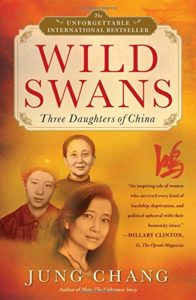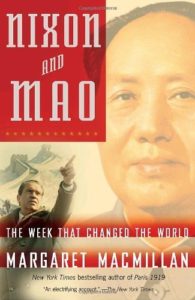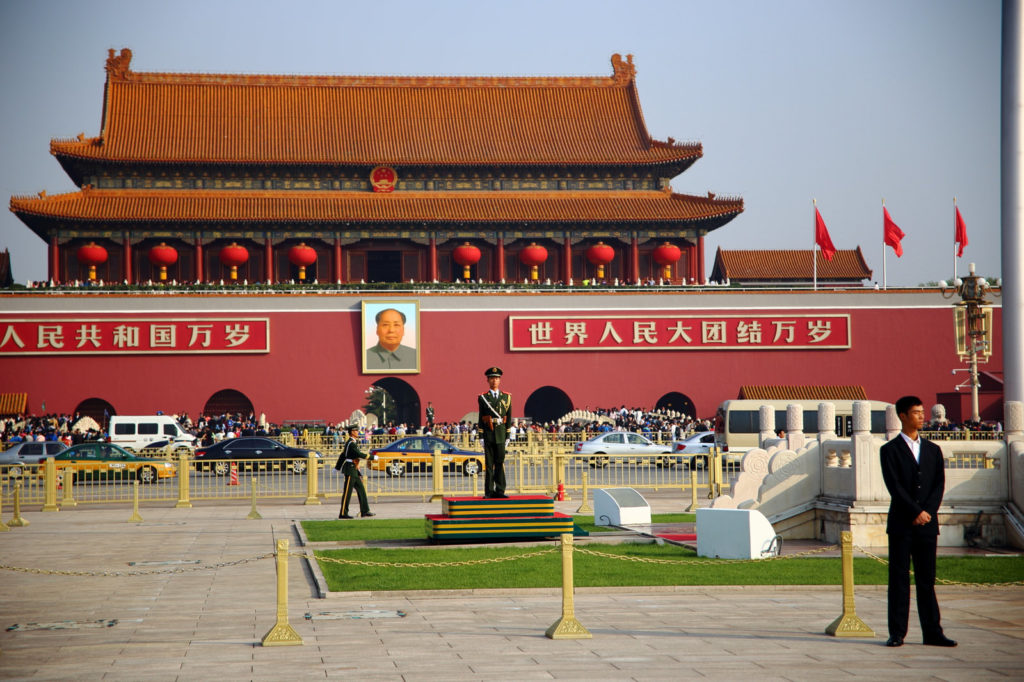See the “Twenty Writers, Twenty Books” home page for more information on the series as well as a list of other reviews and essays.
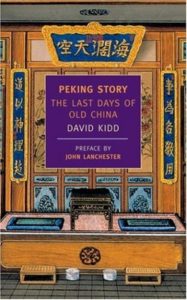
David Kidd’s Peking Story: The Last Days of Old China has settled into a somewhat unnoticed shelf of American literature: the literary eulogy.
Serialized by The New Yorker in 1955, collected in book form in 1961 as All the Emperor’s Horses, and republished in 1988 under the title it holds today, David Kidd’s book is an underappreciated classic in American nonfiction. Memoir, travelogue, New Journalism, creative nonfiction—none of these terms are a snug categorization of Peking Story. The book is wistful, mournful, and laced with dry humor—a eulogy.
As the book opens, Kidd is an American college student on a foreign exchange trip to Beijing in 1946. There he meets Aimee Yu, one daughter among many in a prominent Beijing family. In the span of a few pages, the couple are married. Courting Aimee is more glossed over than spun out, treated as a perfunctory narrative requirement. Peking Story is not a romantic book in the sense of love and matrimony. It’s a romantic book in the sense of Eastern exoticism and lost traditions. It’s right there in the subtitle: The Last Days of Old China.
As the book progresses, David Kidd the narrator develops as a kind of mystery himself. He doesn’t come off as one would imagine most Americans would talk or act in the mid-1940s, especially a college student from the Midwest. There are moments that read like a Graham Greene novel, the world-weary expatriate turning up his nose at the dreary reactionaries and their anti-imperialist manifestos—only Kidd studied at a state school, not Oxford, and his father was an automobile executive rather than a member of Parliament. That’s one of the many mysteries of Peking Story, this American narrator who sounds distinctly un-American, seemingly more comfortable in Chinese silks and soft slippers than sneakers and blue jeans.
The Last Days of Old China
Like Nick Carraway in The Great Gatsby, Kidd goes to some lengths to remain outside the book’s lens, preferring to focus on the events and people around him. Peking Story is a public story told by a very private man, and that shapes the narration and contributes to its unique form.
Kidd alludes to his private nature (and the burden of telling his story) in his preface:
Only a few Westerners who once lived [in pre-Communist Beijing] are still alive today—no more than ten or twenty of us at most, scattered throughout the world. I used to hope that some bright young scholar on a research grant would write about us and our Chinese friends before it was too late and were all dead and gone, folding back into darkness the wonder that had been our lives.
To this day, no such scholar has appeared, leaving me, as far as I know, the lone, first-hand chronicler of those extraordinary years that saw the end of old China, and the beginning of the new.
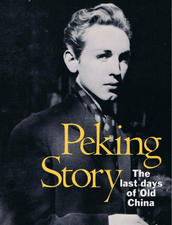
With the courtship and marriage out of the way, David Kidd eagerly moves into the opulent Yu family estate just outside of Beijing. (“Beijing” and “Peking” are Mandarin and Cantonese pronunciations, respectively, for the current capital of China. As Mandarin is now the official language of the People’s Republic of China, I use it here and reserve “Peking” for the book’s title.)
Once situated within the family compound, Kidd slides his marriage away from the reader’s field of vision. In its place he slides in the colorful Yu family and their grand estate, garden, and art collection. Beyond the compound’s walls the Communist revolution begins to encroach on their daily lives. These elements are Kidd’s true focus, with his marriage merely the frame to explain his presence on the estate grounds and in the Yu family’s lives.
The Yu’s are rich beyond the everyday meaning of the word. The family’s history and prominence extends hundreds of years into China’s past. The grandfather was at one time the Chief Justice of the Republic of China’s Supreme Court. The family estate is known for having one the best gardens in Beijing, and perhaps all of China. The Yu’s once held mansions and houses all over northern China, but declining fortunes and currency devaluation have chipped away at their holdings. By the time Kidd arrives, the Yu’s can lay claim to the family mansion, a burial shrine outside the city, and a stunning collection of historical Chinese art they cannot bear to part with.
Arriving in Beijing two years before the Communist Revolution and leaving two years after it, Kidd witnessed China’s transition from a strict traditional society with deep class striations into a political culture intent on leveling the field and erasing its past. Rather than write this story with a breathless, you-are-there urgency, Kidd describes the changes from the comfort and safety of the Yu estate. Kidd’s encounters with the new Communist regime comes fleetingly, such as when they must register with the local police that the Yu’s intend to hold a costume party. Kidd portrays the revolutionaries as dreary, inconvenient, and déclassé.
I normally hold little interest in British entertainment of the upper-class variety, with the rich lolling about on their divans and club chairs, plotting intrigue against each other, while servants rush up and down stairs attending to their every whim. Peking Story is not this type of entertainment, but it certainly skirts its edges. For all of Kidd’s blind spots, Peking Story works because Kidd’s focus is to document the Yu’s way of life crumbling beneath their feet. Rather than pick up guns and defend their estate—what an American story that would be—the Yu’s shrug, brew another pot of tea, and reflect upon their garden before it’s wrested from them. The tension between dynamism and stasis is the backbone of Peking Story.
The bronze braziers
As a fiction writer, what I draw from Peking Story is Kidd’s skillfulness at sketching out characters and painting colorful scenes with graceful economy. Although Kidd comes across as waspy throughout the book (and a bit blithe to the poverty about him), his education and breeding gifted him with a clean writing style that flows effortlessly. It’s harder than it looks.
Kidd’s narrative construction is as classical as his prose. The chapters are arranged almost perfectly. Early scenes that read as little more than humorous anecdotes are later revealed as precursors of devastating consequences for the Yu family. Kidd neatly sews disparate events together to craft chapters that compare and contrast China’s culture and the steamrolling revolution. Although “compare & contrast” rings like a English teacher’s tired essay topic, these pairings illuminate the reader’s way through Peking Story like a trail of paper lanterns.
The most memorable episode in Peking Story relates to a collection of bronze braziers the Yu’s display throughout their mansion. As Kidd tells it, the luster of these incense burners is indescribable. They must be continually heated in order to keep their sheen, and so the Yu’s charge their servants to maintain a small charcoal fire burning beneath each at all hours. Kidd writes that the Yu family has kept the fires lit and the braziers hot for hundreds of years.
Encouraged by the Communists beyond the estate walls, the servants begin to question the nature of their employment. One morning, the Yu’s discover the charcoal fires have been extinguished. The once-indescribable bronze braziers are now irreparably dull and gray.
The tale of the bronze braziers is the perfect metaphor for the aristocratic Yu family straining to bolster China’s ancient culture against the Communist revolution threatening to overthrow it all.
However, the story may be too perfect:
I hope that specialists in Chinese bronzes, and technical experts, will back me up in saying that the story is completely phony—as is, I felt on reading it, much of the rest of the book. That Kidd had married Aimee Yu was plausible, although when I knew him he was plainly gay—he might have changed, or could—entirely laudably—have married her to get her out of China. But the obviously deceptive picture that the book painted was upsetting; this is one of the few books I’ve read that made me angry.
James Cahill’s rebuttal to Peking Story is well worth the read. He voices here a suspicion I too had in the back of my mind the first time I read the story of the bronze braziers. Their sublime beauty destroyed by ideological malice seems a writerly addition by Kidd who (possibly) felt the need to put an authorial thumb on the novel’s moral scale.
I’m torn on this subject. Cahill’s objections are worth any reader’s consideration, but I still find myself drawn to the elegance and power of Kidd’s prose. I don’t particularly care about his sexual orientation, although it certainly explains why his marriage takes a back seat in the book.
In Kidd’s defense, unlike fabricators such as James Frey (A Million Little Pieces) and JT Leroy, Kidd’s falsehoods—if they are false—don’t create an undeserved authority or prop up an exaggerated persona. His presence in China is documented, as is his marriage to Aimee Yu. The parable of the bronze braziers sweetens the book, the kind of misstep even a seasoned novelist might make to seal a point with the reader.
It’s not the first time a well-respected work of nonfiction was revealed to contain fabrications and get a pass. Questions about the veracity of Steinbeck’s Travels with Charley have been received with a shrug by Steinbeck fans and academics. If Cahill is “angry” at the “deceptive” Peking Story, he must be outraged at Steinbeck. If not, why? Because Steinbeck’s sympathies are on the right side of history and Kidd’s are not?
(If Kidd stretched the truth, it’s conceivable a kernel of truth inspired the story. Even if the braziers were not required to remain heated to sustain their beauty, it’s possible the Yu’s kept incense burning day and night throughout the household, and that one night the servants rebelled, damaging them somehow. The metaphor of an Old China lost is not so strong, but its thrust remains. Where Cahill sees deception, I see craft.)
The reader’s reaction to the story of the bronze braziers is a leading indicator of the way they’ll receive the entire book. Some will toss the book aside, disgusted with Kidd’s approval of Chinese high society and disdain of the servants. Others will sympathize with the Yu’s, for no reason other than their desire to preserve a four thousand year-old culture and its rich traditions. In either case, Kidd’s parable frames the entire book and the reader’s reception of it. It’s that kind of skill that encourages me to write a 2,200 word essay on Peking Story.
However, I’m less sure Kidd’s sympathies lie with the Chinese aristocracy per se. Kidd does not present the Yu’s as bold keepers of the flame, but rather as eccentrics of the Miss Havisham variety. Without exception, Kidd’s tragedies are the loss and destruction of Chinese art, culture, and tradition. Kidd mourns for the dispersal of the Yu collection and estate more than any death in the book. He also mourns the death of common sense. In Kidd’s hands, registering a costume party with the Beijing police is as absurd as proving to the American consulate his wife is Christian to guarantee her visa out of the country.
Then there’s the matter of Cahill accusing Kidd of kowtowing to “anti-Communist sentiment in the U.S.,” guessing Kidd was “encouraged somehow by the powerful and rich China lobby.”
Kidd may be accused of all manner of motivation, I suppose, but Occam’s Razor strikes me as appropriate here. I see Kidd as genuinely upset at the rearrangement of Chinese culture and its priorities. He seems deeply shocked to witness a four thousand year-old cultural legacy deleted in a fit of moral outrage. The suggestion of shadowy, powerful forces funding a book that, frankly, did little to shape American attitudes toward Communist China is unnecessary to explain the existence of Peking Story. I also don’t view The New Yorker—even The New Yorker of the 1950s—as a publication to kowtow to right-wing nationalists.
Fabricator or not, Kidd is forthright with his opinions and biases. When it comes to motivation, it’s simplest to take Kidd at his word. Cahill, on the other hand, appears more motivated by a sense of social justice than he’s letting on in his essay.
What’s more, for Cahill to argue Kidd misrepresented the Chinese Communists as a “mean-spirited movement” is to ignore the crop yielded by Maoism: The Cultural Revolution, an artificial civil war unleashed by Mao to silence his critics and tighten his grip on the levers of power; its annihilating purges, denunciations, self-criticisms, and “struggle sessions”; the anti-intellectualism behind the forced relocation and labor of students, leading to China’s own “Lost Generation”; and the party’s historical rewriting and reeducation tactics. Kidd’s stories, first published eleven years before the Cultural Revolution’s earliest stirrings, practically predicts the furies to unfold. It’s a literary feat almost as impressive as Graham Greene warning the United States out of Vietnam in 1955’s The Quiet American.
The 21st century may be China’s century, but Peking Story eulogizes the price China paid to make its great lurch forward.

David Kidd died in in 1996 leaving behind a life as far-removed from his Midwestern origins as possible. After fleeing Beijing, he settled in Kyoto and founded a school of traditional Japanese arts:
As a tourist attraction, Mr. Kidd did not disappoint. To sit on a cushion before his throne, listening to his erudite patter, and seeing him sitting cross-legged on his kang, a divided Chinese sofa, rustling his silken gown as he gestured extravagantly with his inevitable cigarette, was to be in the presence of a presence.
With China’s role ascending in the 21st century, I would recommend Peking Story to anyone curious to learn about China’s future from its past. For those who want to go deeper, I would pair Peking Story with the superb Wild Swans: Three Daughters of China by Jung Chang and Nixon and Mao: The Week That Changed the World by Margaret MacMillan.
